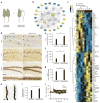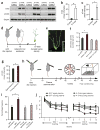Young blood reverses age-related impairments in cognitive function and synaptic plasticity in mice
- PMID: 24793238
- PMCID: PMC4224436
- DOI: 10.1038/nm.3569
Young blood reverses age-related impairments in cognitive function and synaptic plasticity in mice
Abstract
As human lifespan increases, a greater fraction of the population is suffering from age-related cognitive impairments, making it important to elucidate a means to combat the effects of aging. Here we report that exposure of an aged animal to young blood can counteract and reverse pre-existing effects of brain aging at the molecular, structural, functional and cognitive level. Genome-wide microarray analysis of heterochronic parabionts--in which circulatory systems of young and aged animals are connected--identified synaptic plasticity-related transcriptional changes in the hippocampus of aged mice. Dendritic spine density of mature neurons increased and synaptic plasticity improved in the hippocampus of aged heterochronic parabionts. At the cognitive level, systemic administration of young blood plasma into aged mice improved age-related cognitive impairments in both contextual fear conditioning and spatial learning and memory. Structural and cognitive enhancements elicited by exposure to young blood are mediated, in part, by activation of the cyclic AMP response element binding protein (Creb) in the aged hippocampus. Our data indicate that exposure of aged mice to young blood late in life is capable of rejuvenating synaptic plasticity and improving cognitive function.
Conflict of interest statement
The authors declare competing financial interests: details are available in the online version of the paper.
Figures



Comment in
-
Brain ageing: Blood-derived rejuvenation.Nat Rev Neurosci. 2014 Jun;15(6):352-3. doi: 10.1038/nrn3763. Nat Rev Neurosci. 2014. PMID: 24840795 No abstract available.
-
Ageing: Could young blood combat age-related cognitive decline?Nat Rev Neurol. 2014 Jun;10(6):307. doi: 10.1038/nrneurol.2014.86. Epub 2014 May 20. Nat Rev Neurol. 2014. PMID: 24840974 No abstract available.
-
Young blood rejuvenates old brains.Nat Med. 2014 Jun;20(6):582-3. doi: 10.1038/nm.3597. Nat Med. 2014. PMID: 24901563 No abstract available.
-
Blood platelet factor 4: the elixir of brain rejuvenation.Mol Neurodegener. 2024 Jan 7;19(1):3. doi: 10.1186/s13024-023-00681-w. Mol Neurodegener. 2024. PMID: 38185628 Free PMC article. No abstract available.
References
-
- Hebert LE, Scherr PA, Bienias JL, Bennett DA, Evans DA. Alzheimer disease in the US population: prevalence estimates using the 2000 census. Arch Neurol. 2003;60:1119–1122. - PubMed
-
- Hedden T, Gabrieli JD. Insights into the ageing mind: a view from cognitive neuroscience. Nat Rev Neurosci. 2004;5:87–96. - PubMed
-
- Raz N, Gunning-Dixon FM, Head D, Dupuis JH, Acker JD. Neuroanatomical correlates of cognitive aging: evidence from structural magnetic resonance imaging. Neuropsychology. 1998;12:95–114. - PubMed
Publication types
MeSH terms
Substances
Grants and funding
- AG03144/AG/NIA NIH HHS/United States
- R01 AG045034/AG/NIA NIH HHS/United States
- UL1-TR000004/TR/NCATS NIH HHS/United States
- T32 MH020016/MH/NIMH NIH HHS/United States
- 1F31-AG034045-01/AG/NIA NIH HHS/United States
- DP5 OD012178/OD/NIH HHS/United States
- UL1 RR025744/RR/NCRR NIH HHS/United States
- UL1 TR001085/TR/NCATS NIH HHS/United States
- T32 GM008568/GM/NIGMS NIH HHS/United States
- T32 HD007470/HD/NICHD NIH HHS/United States
- UL1-RR025744/RR/NCRR NIH HHS/United States
- AG045034/AG/NIA NIH HHS/United States
- DP5-OD1217/OD/NIH HHS/United States
- UL1 TR000004/TR/NCATS NIH HHS/United States
- F31 AG034045/AG/NIA NIH HHS/United States
LinkOut - more resources
Full Text Sources
Other Literature Sources
Medical
Research Materials
Miscellaneous

